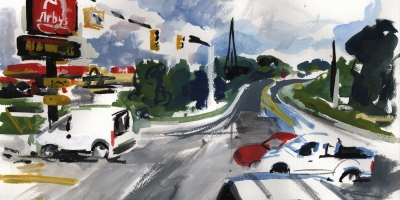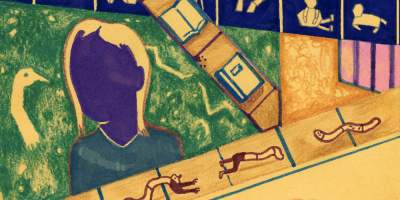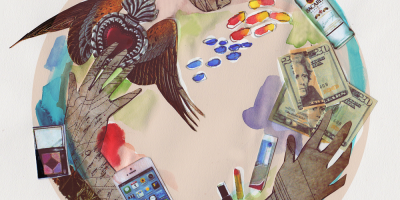Fiction
Trizas/Fragments
by Lilliam Rivera

There are fifteen steps leading to the coffin. Yvette stands sandwiched between her brother and her aunt, unable to move. She wears an oversized sweatshirt and baggy jeans, clothes borrowed from her teenage son, the one hiding behind his phone.
“I don’t know how to say goodbye,” Yvette whispers. She didn’t sleep last night. It feels as if she hasn’t slept in months.
Her brother Anthony stands next to her, holding her up. She can feel him choking down his anger by how tightly he grips her arm. Anthony’s wearing his corrections officer’s uniform, his gold cross glistening against his light blue shirt. He’ll scream at her later that week before tossing her bus fare for the long ride back home. Yvette’s son will stay with Anthony because the boy belongs with someone who will take care of him. Her brother offers her no consoling words. He just stares straight ahead, the veins on his neck bulging.
“Go up there and ask him for his blessing,” her Aunt Millie says. Millie was the first family member to hold Yvette when she was born. “Mi negrita,” she called her. When Yvette had problems at home, she would always hide out at Millie’s walk-up on 150th Street and Morris Avenue. But after a while, Yvette’s problems became too big for even her aunt to handle. Millie tells her that her father is in a better place, that he’s no longer suffering, but Yvette isn’t listening.
“He’s there in the casket, but that’s not him,” Yvette says. “That’s not him.”
Yvette notices the workers from the funeral home, all urgency on their faces. The service is way behind schedule because of her. The workers keep checking the clock on the wall until the one with the softest face approaches them. He only addresses Anthony. Anthony offers the worker cash, apologizing for the delay. Her brother has always been good at that.
When Yvette’s mother walks past them, Millie tries to press Yvette’s hand toward her, but the old woman ignores the gesture. Yvette wants to run, to get the hell out of there and go back to the spot. The family always teased Yvette that she was an easy birth and that was why she was trouble. When her mother threatened to take the kids away, Yvette broke into the apartment and stole the money the woman kept stashed underneath the Santa Barbara statue. The money was from La Asociación. Each month, friends and family pooled together what they could spare, creating their own little lending bank. It was her mother’s turn to keep the money safe. But Yvette took the 5G and, with it, her mother’s last hope of Yvette ever changing.
Her mother greets each of the mourners as if they are at a normal family gathering.
“Are you hungry?” she asks an old friend. “Do you want me to make you a plate to take home?”
But all of the mourners are busy staring at Yvette. Waiting.
“Go ahead, baby,” Millie says. “Say your goodbye.”
Yvette cries, but inside she feels numb. The man who raised her is only a shell, lying there in his best suit. No matter what she did, how she played the family, he always welcomed her back home. While the rest of her family shook their heads, her father was the only one insisting that Yvette needed more than just their reproach. “She’s not as strong as she looks,” he said. How many times did he sit her down next to him on that lumpy sofa, making sure she ate, slipping her some cash? “You are part of me,” he said. “I’m a good person, and that makes you a good person too.” But now the only man that made her feel has been replaced by a cold corpse.
Last Night
Yvette didn’t have to walk far to find him. The first place she hit was the Webster Projects. She knew he would be in the exit that faced the rocks. That’s where they used to hide when they played kick the can. At that late hour, the exit conceals everything.
“Where you been at?” Carlos asks. It’s been three years since he last saw her, but he acts as if she’s just returned from buying a quarter drink at the bodega. When they were both teenagers, Carlos told the guys on the block that he was going to pop her cherry. He didn’t, but she let him slide in his finger that one time when they were alone hanging out at I.S. 127. They broke night, and when Yvette returned home, her mother took the broom to her back until it snapped in two. Her father sat her down and spoke with gentle words, as he always did. “You can’t keep doing these things,” he said. She promised him that she would stop.
“I live in Pennsylvania now,” she tells Carlos. Her thin lips are smeared with lip gloss borrowed from her youngest daughter, the one who lives with Yvette’s ex. The smell of watermelon candy turns her stomach.
“Word?” Carlos says. He wasn’t always fat. They used to call him Marc Anthony Lite because he was skinny like the singer. There are six in his family, all boys. He’s the only holdout that stayed in the projects. He doesn’t hide the pipe in his hand. Why should he? They go way back. Yvette wants Carlos to offer. She doesn’t want to ask. He sits down on the step and pulls out his stash from his pocket.
“I heard about your father,” he says.
Yvette winces. “I don’t want to think about that. I don’t want to think.”
Carlos nods and offers the pipe to her. He reminisces about that time they broke night, but she’s no longer with him. It lasts only for a few minutes.
Five Days Ago
She walks fast, New York fast.
“You can’t come in here with that,” the nurse says, scrambling to keep up with Yvette. The paper bag is covering the bottle of Bacardi she stole from her Aunt Millie’s house. She stops in front of the nurse and gulps down the rest of it before throwing it into the trash.
“Visiting hours are over,” the nurse says. It’s three in the morning.
“I’m helping my mother,” Yvette answers. “She needs a break.”
The nurse looks at her suspiciously.
“I just got here,” Yvette says. “What room is David Salgado in?”
A patient cries out in another room and the nurse lets out a long sigh. “He’s in room twenty-four,” she says.
The curtain is drawn and the light is dimmed. Yvette hesitates by the door. She tucks in her stained blouse and uses her fingers to comb through the knots in her damaged hair. They’d waited so long to tell her that her father was sick. When Anthony called to say that time was running out, Yvette cursed him out for lying. He wired the bus fare, but she didn’t come right away. Yvette couldn’t get her shit together, and just maybe, she thought, it would be all over before she even got there.
When she pulls the curtain and sees her father, her gasp awakens her mother, who was asleep in a chair. Her coat is draped on her lap like a blanket.
“Yvette?” Her mother clutches the coat as if she’s afraid that her daughter will take it from her. It’s a subtle motion, but Yvette notices it. “You just got here?”
Yvette nods. She is still standing by the entrance.
Her mother empties a chair for Yvette. Her movements are labored. She places the chair away from her.
“He’s asleep,” she says. “Sit down.”
“How is he doing?”
“Look at him,” her mother answers with an angry edge.
Yvette looks away to rub the tears streaming down her cheek.
They sit like that, not saying a word, waiting for her father to wake up. The hospital pajamas can’t conceal his emaciated frame. His hair stands in confusing angles. He always took pride in his appearance. It didn’t matter that he worked as a cook at a diner. Her father wore cologne every day, his white shirts pressed. Yvette wants to brush his hair, but she’s afraid to touch him. All those tubes and the whirling sounds of machines.
Her mother eventually nods off and Yvette stares at her. There are more gray hairs. More wrinkles. The purse is right by her. Her mother always carries an emergency $100 bill. All Yvette has to do is reach in. It would be more than enough. The last time they spoke, Yvette called to ask for money, but her mother hung up.
The nurse comes in to alert them that her shift is ending and the morning crew will be taking over. Her mother stands and walks over to her father. She takes a towel, wets it with warm water, and wipes his face. She used to do the same thing to Yvette when she was young, but she was never as tender with her.
“Your mother hasn’t left the room all day and night,” the nurse says.
“Go get breakfast,” Yvette tells her mother. “I’m not going anywhere. Go.”
The nurse urges her mother to listen. Yvette knows that her mother will not put up much of a fight in front of a stranger. Before leaving, her mother eyes Yvette and grabs her purse.
Yvette searches the room. He’s on morphine, the good stuff, but there’s got to be more. There’s no doubt Yvette’s going to take something, because she’s been taking all her life. She gets up and opens the cabinets. When did she fall? There isn’t a set moment or time. No obvious story line. Her father once said that she just felt everything too much, like him.
“Why didn’t you wait for me, Evie?”
His voice jolts her.
“Why didn’t you wait, Evie?” he repeats. Although his voice is rough, he sounds like a child. “I wanted to go to las rocas with you. You didn’t wait.”
Las rocas was a place her father always longed for. His own secret spot back on the island. “You can always go back to las rocas,” he would say to her when she was upset.
He is crying, and Yvette calls out to the nurse.
“Don’t leave me,” he says.
She wants to run.
“Why, Evie?” He is crying out more deeply. His hands shake. “Why?”
“I’m not Evie,” she says loudly. “It’s Yvette, Papi.”
He tries to get up, but all the tubes. Yvette calls out louder to the nurse.
“Don’t leave me,” he says. His eyes are brimming, and Yvette’s chest hurts. She doesn’t know what to do. He’s pleading with her.
“I promise. I won’t leave you, Papi,” she says. She rests her hand on his, and he settles back down. “I promise.”
Yvette stays for as long as she can.
Fifteen Years Ago
Yvette holds tight. He carries her when the fallen branches and growth are too high for her to climb over. When they reach the isolated sandy cove, he slips off his sandals and tells her to do the same.
“This is where I would go to think,” he says. “See, over there? That was my rock.”
Yvette sees the big jutting rock. It’s smooth and gray, the color of a space ship.
“C’mon,” he says, pulling her toward it. The water feels so warm, and she wants to go in, but first the rock.
He tells her how he came here when he was about her age, maybe a little younger. It was his older sister Evie that took him there, the one who died.
“We named you after her,” he says.
“How did she die, Papi?” Yvette asks.
He brushes the question away by lifting her up on the rock. No one ever talks about Evie. She’s more ghost than person, an unanswered question. Yvette will learn later that it was her father who found her. They said it was an accident, that Evie must have been playing with the gun hidden in the closet. A mistake, they said. Yvette has stared at the pictures in the photo albums wondering where the resemblance begins.
Her father joins her on the rock, and they wait for the surf to reach them. He tells her to close her eyes as wave upon wave splashes them. Yvette screams each time. The water turns rough, but she looks up to her father and he is laughing. He never lets go of her hand.





